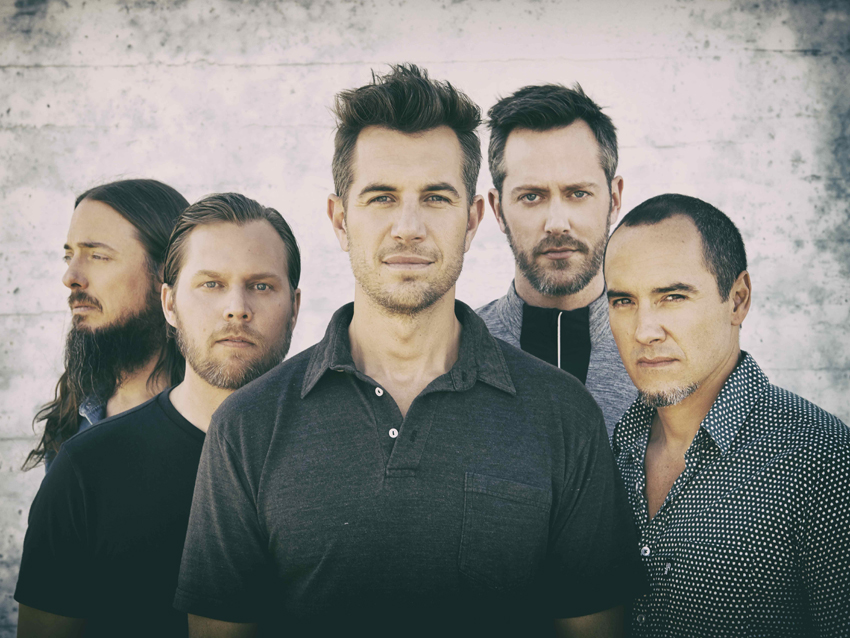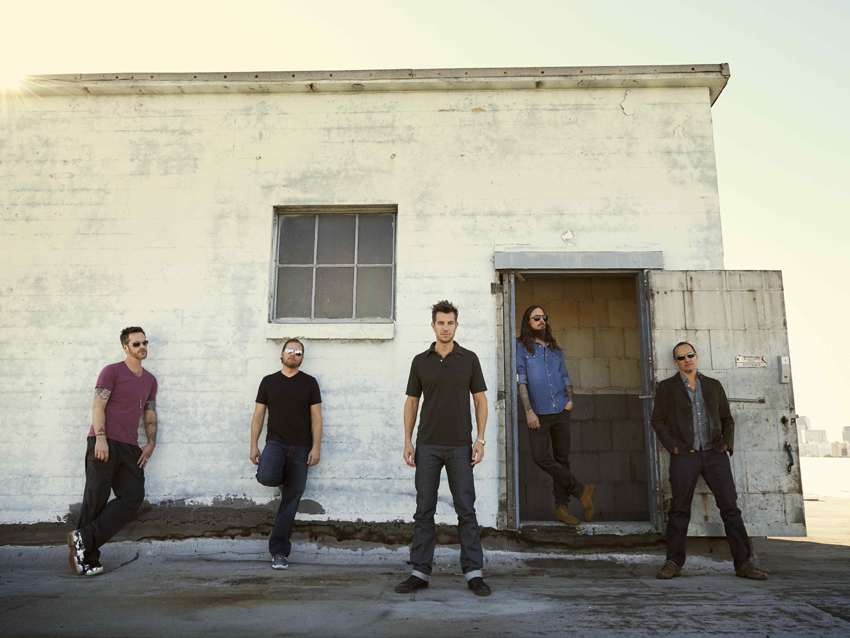
311's Nick Hexum talks guitar sounds, prog rock and the new CD, Stereolithic
Last year, guitarist and singer Nick Hexum took his first real break from 311 in 25 years by forming The Nick Hexum Quintet. The group released a well-received album titled My Shadow Pages that mixed even more musical styles than his genre-blurring day-job band usually does.
“I needed to take a detour for a while, and the Quintet was the perfect move for me," Hexum explains. "We did a lot of light, funky stuff, and then I was able to get back into some heaviness with 311. It’s good to keep another avenue open. If I’m working on something and 311 isn’t feeling it, I’ll have that other outlet. It just means more music for the fans.”
Hexum played a series of dates with Quintet earlier this year before throwing himself into the completion of 311's new album, Stereolithic. The 15-song disc is the group's most collaborative effort yet, with DJ and co-vocalist Doug "SA" Martinez, bassist P-Nut and returning producer Scotch Ralston all working with Hexum on lyrics.
Hexum talked to MusicRadar about the new record, reuniting with their trusty board man, prog rock and how The Beatles influenced one of his new songs. (You can order Stereolithic at iTunes.)
311 are one of the first bands to mix rock, rap and reggae. If you were a brand-new group right now, who do you think you’d be looking to in those respective genres?
“Oh the rap side of things, Kendrick Lamar is very quirky and weird and creative. I really enjoy what he does a whole lot. He’s got different side projects that are cool. He’s one of the few hip-hop artists that I still follow. I can get into the hits of the day, but it’s nothing like the conscious hip-hop of De La Soul, A Tribe Called Quest and Public Enemy. For me, that was the pinnacle of creativity in rap. There’s some good stuff now, but it’s become so materialistic that it turns me off.
“As far as rock music, the great thing about it is its long history. This morning I was listening to Who’s Next by The Who, and I was blown away by how creative and brilliant it was – and still is. I’ve been going through a lot of older stuff. Whenever I read a rock biography, I break out the catalogue of that artist. I just read When Gods Roamed The Earth, and then I immersed myself in Zeppelin for a few months.
“Rock radio has been overtaken by a lot of folky, vibey stuff that doesn’t rock super hard. I can get into it, but the stuff seems to come and go. I wouldn’t say that I listen to a lot of current bands. The journey continues there.
“On the reggae front, I’ll make a playlist of stuff by Slightly Stoopid, Cali Greens and different things that are things coming out of Jamaica. I wouldn’t say there’s any core artists I’m all about. There’s some American ones that are making some good, vibrant reggae music – Rebelution, Sublime With Rome, some of the bands we’ve toured with.
You guys strove to incorporate some new sounds on the record. How far do you think you can stretch what 311 is? After a certain point, fans tend to go, “Uh-uh. You went to far.” Like AC/DC – they can never change. Their fans won’t let them.
“Yeah, that’s interesting. AC/DC’s a good example of a band that people only want the tried and true classic sound from them. I think we were fortunate to always give ourselves a wide range of sounds, even from the beginning. In some ways, it started to get a little conservative, and that’s something I wanted to change. There wasn’t as much diversity on Universal Pulse – there were a lot of good rockers – but on the new record there are songs like Tranquility and Made In the Shade and Friday Afternoon that really expand our palette of sounds.
“Our fans can be pretty broad-minded and forgiving, so that’s a good thing. We want to mix it up and keep it interesting for ourselves, and hopefully that’ll be interesting for our fans.”

On full band collaboration
Photo: 311, 2013: (from left) Tim Mahoney, Chad Sexton, Nick Hexum, P-Nut, SA Martinez.
There was a lot more collaboration in the writing on this record. Why did the band not write together as much in the past?
“I think in an earlier phase… Take a song like All Mixed Up. I came out of being in this huge spurt of creativity in one day, but maybe now, in order to keep it fresh, I wouldn’t want to take a song from beginning to end – it’ll just sound like a Nick song. I think a better way to expand the creativity is to say, ‘Here’s a Nick song combined with Chad and P-Nut and Scotch and everybody writing.’ It changes things up.
“I used to just be really amped up about finishing ideas myself. That's not so important now. Now I’m into starting a song and passing it to somebody else to finish. Having P-Nut writing some key lyrics has been cool. That started on the previous album, and now the lyric team is me and SA and P-Nut and Scotch.
“We wouldn’t even know what we were gonna write about till we got into a room. P-Nut would say, ‘You know, I saw this couple the other day. They were out on a date with each other, but their faces were in their phones the entire time.’ That starts an idea about how technology was supposed to bring us together, but in a lot of ways we’re checked out. Concepts like that would come out of conversations.”
The band took a long break from working with Scotch. You had some of your biggest successes with him – a lot of bands wouldn’t want to mess with that.
“I hear you. Scotch is a really unusual dude. He’s lived in an RV for most of the time I’ve known him. He’s super-nomadic, like, ‘I feel like going to this gig tonight.’ And he’ll just go. He’s the quirkiest guy; a lot of times we have no idea what he’s up to. For a producer, it can be cool to go to the beat of his own drummer and just be, like, fiercely individualistic.
“He was off working with other bands and doing some other things for a while. We asked him to come back and do our live sound, and he did a really good job at it. He had so much enthusiasm for our new songs; it’s like he was a force of nature. He’d go into our studio – he called it ‘goldmining’ – and he’d go through the hard drives and all these partially finished demos. Quite a few of them got worked up to completion, so that’s why there’s 15 songs on the record. He’d adopt a lot of orphan songs that we’d forgotten about.”

On 311's first producer, Eddy Offord
Your first producer, Eddy Offord, came from the world of ELP and Yes. On paper, the combination of him and 311 still looks kind of strange.
“Yeah, I know. It was a good fit, though. He had a ton of experience with progressive rock in the ‘70s, and to bring that kind of track record in with our crazy, 21-year-old youth exuberance, it kind of worked. He helped in other ways because he committed to working with us before we had a record deal; that gave us a lot of credibility and helped us get the record deal that we did. We owe him a big debt of gratitude.”
A lot of bands your age at the time wouldn’t have wanted to be in the studio with a guy who did '70s progressive music. Prog wasn’t cool then the way it is now.
“Yeah, that’s true. We didn’t have any of that elitism – ‘Oh, we’re so cool’ and all that. We always loved rock. We didn’t have any kind of bias towards prog rock. The truth is, there was such incredible creativity to those records Eddy did with Yes and ELP. If anything, at the time there was so much grunge and everything was sounding the same, so to work with somebody who had an ‘anything goes’ attitude, it was liberating. He wasn’t trying to keep us in a box.”
Did you record the whole album in a studio, or was there any work done at home? Anything done on laptops?
“Because we wanted to get this album out in time for 311 Day, we worked at a crazy pace. We had four different studios going at the same time. The technology definitely helped us because we could share files and send Pro Tools sessions back and forth between studios. You know, there’s so many good and bad effects of the internet and technology. There’s the democratization that’s gone on: You don’t have the gatekeepers. In the old days, you had to have a major record label; now you don’t.
On the negative side of the internet, there’s the piracy. It’s become a free-for-all, and a lot of people don’t even think about grabbing music from wherever. We’ve always been mainstays of the live performance, which is an experience you can’t bootleg. You can record it, but it’s never like being there. We’ve always kept an eye on new trends and have been learning about the new distribution deals. On this record, we’re completely independent, which is pretty exciting.”

Guitar sounds
Photo: 311, 2014: (from left) P-Nut, Chad Sexton, Nick Hexum, Tim Mahoney, SA Martinez.
The echo and reverb guitar sounds on 311 records have always reminded me of the way the guitars sounded on Clash records when they dabbled in reggae and dub. Did you listen to those records a lot?
“Oh, yeah. Thanks! You know, for our sounds, it comes from a variety of sources. I’m more on the digital tip – I’ve got a master of plugins and a lot of audio software that I really love. When you hear my guitar tone, it’s probably a digital re-creation of cool analogue gear. Tim is more of a purist. He doesn’t let any digital stuff touch his sound. He’s got every effect pedal in the world and three different amps going at different times, and he combines those sounds. I think it’s a nice blend to have one vintage guy and one modern guy. You can tell Tim and me apart – I tend to be on the right channel, and he’s more likely to be on the left.”
Friday Afternoon is a short little epic. It’s trippy and dreamy, and then, when you least expect it, it goes into a blast of Iron Maiden-like dual-guitar soloing. I heard that you were inspired by the structure of The Beatles’ Happiness Is A Warm Gun for this song.
“Yeah, I was. With Happiness Is A Warm Gun, I realized that you can make left turns work. The first song I wrote that had that quality was Sometimes Jacks Rule The Realm; I think there’s been one on every album that we call an epic. It’s cool to have all those changes and have them work.
“There’s the really heavy part in Friday Afternoon – it gets slow and there's a reggae off beat to it – and it goes into a Bach quote for about 20 seconds. I checked with my lawyer, and he said that it was OK to quote people who are in the public domain. Going from a Bach-inspired part to a section that has been described as Iron Maiden-like, that’s what gets me going. That’s a cool bit of weirdness.”
Speaking of dreamy, there’s a real wistful quality to the vocals in Tranquility. I hear a Beach Boys influence there.
“Absolutely. The Beach Boys were huge for me. My dad and I used to go camping in the summer, and we’d take a few Beach Boys cassettes with us. We’d play them over and over again and sing along. Brian Wilson’s writing and his harmonies have always been an influence. But I think that song also has a philosophical and spiritual influence that comes from U2. It doesn’t sound like U2, but it has a similar kind of lyrical weight. Like I said, we mix it all up.”
Joe is a freelance journalist who has, over the past few decades, interviewed hundreds of guitarists for Guitar World, Guitar Player, MusicRadar and Classic Rock. He is also a former editor of Guitar World, contributing writer for Guitar Aficionado and VP of A&R for Island Records. He’s an enthusiastic guitarist, but he’s nowhere near the likes of the people he interviews. Surprisingly, his skills are more suited to the drums. If you need a drummer for your Beatles tribute band, look him up.
